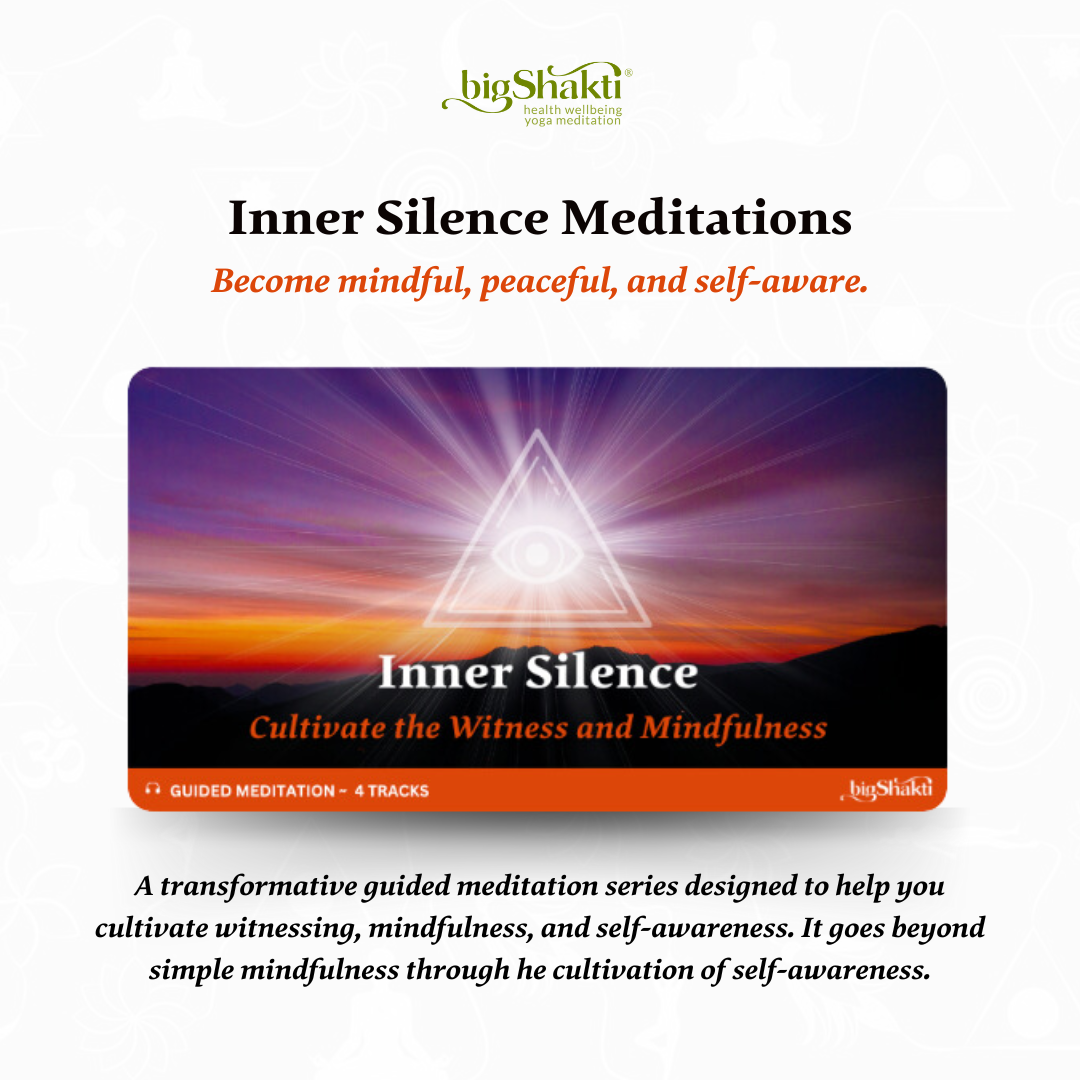Yoga of Mental Health Workshops → More Info
How Overthinking Burdens Your Body, Mind and Spirit

Overthinking. It's a common experience we all share, some of us more than others. At times, overthinking can feel like our minds are burdened, affecting our body and spirit.
The mind relentlessly creates thousands of thoughts daily. In less than a minute, you can fret over a recent hurt, ponder what to cook for dinner, remind yourself to make a call, and worry about the planet's survival. This is the miracle of the mind; it has the potential to travel far and wide within the blink of an eye.
But how busy are our minds, really?
Neurological studies revealed that the average person generates between 6,000 and 60,000 thoughts daily in recent decades.
Shockingly, about 90% of those thoughts are recurring, and 80% are negative.

Neuroscientists define "negative" thoughts as those of little or no benefit to your well-being or aspirations. In other words, these thoughts don’t add value or improve life in any way—quite the opposite.
Despite the mind's miraculous elasticity, the natural tendency is to ruminate – to magnify troubling thoughts, which depletes emotional, mental, and psychic energy. While some reflection is natural, Western psychology and Eastern healing traditions agree that overthinking burdens the body, mind, and spirit.
The challenge lies in recognizing when healthy reflection turns into overthinking—a distinction that's not easily made.
Trying to Stop Yourself from the burden of Overthinking
Given this information, your initial reaction to overthinking may be to look for a switch to turn off your negative thoughts and keep your more positive ones.
You might imagine that you can think yourself into thinking better thoughts.
Attempting to control our thoughts, even for a brief period, can be challenging. It requires significant willpower and concentration.
Just as the heart must beat, the brain must think—that's its nature.
A more practical and enduring approach is to gain some psychological insight into how the mind works and tools for managing the mind.
In my experience, Eastern systems of knowledge and practice are best for understanding and alleviating the burden of overthinking from the body, mind and spirit.
Yoga psychology is one of these systems.
It provides a highly valuable perspective on the nature of the mind and superb techniques for disrupting repetitive, negative thought patterns.

Yoga Psychology’s Understanding of Overthinking
Yoga psychology views the mind as a complex system with several parts. Let’s focus on two key components relevant to understanding and managing overthinking.
The aspect of the mind that overthinks
In yoga psychology, the lower-thinking mind is called manas. Manas is the part of the mind that determines how you think, remember, desire, and feel. Manas is the aspect that overthinks.
Manas shapes your unique perception of the world and acts as the initial filter through which you experience and interpret your environment. It's the part of your mind that is always on, cognizing, experiencing, and processing what's happening within and around you.
Manas works by taking in information from your senses—what you see, hear, smell, taste, and touch—and then translating this information into thoughts and mental impressions. This process helps you make sense of your experiences by forming quick judgments about them.
Beyond processing immediate sensory information, manas accesses stored memories and generates desires and emotional responses based on current experiences and memories.
This interplay between the present and past helps to guide your behavior and decision-making. When you're faced with choices, manas assesses options by comparing your current situation with your accumulated knowledge and experiences.
The aspect of the mind that knows
In yoga psychology, the higher, knowing mind is called buddhi.
The words buddhi and Buddha originate from the Sanskrit root budh, meaning to awaken, understand, or know. This aspect of your mind is connected to intelligence, awareness, intuition, and wisdom.
The primary functions of buddhi include clear thinking and the ability to discriminate between options. It discerns what's real from unreal, permanent from impermanent, and provides sound judgments that keep you safe and balanced.
This aspect of the mind enables you to take a step back, assess situations objectively, and make choices aligned with your deeper values, aspirations, and long-term well-being.
Like an inner guide, it directs you toward thoughtful choices and promotes a deeper understanding of yourself and your place in the world. Its intuitive nature helps you recognize what's truly beneficial, enabling you to navigate life authentically and wisely.
Since buddhi shapes your sense of self and hones your ability to gain an accurate perspective on life, it’s instrumental in self-understanding and knowing your life’s purpose. {link to life purpose course)
Manas and Buddhi Relationship – Two Minds Much Better Than One
To experience sound mental health, these two aspects of the mind, manas and buddhi, must remain connected. If they become disconnected, buddhi becomes dormant, and manas becomes overburdened. In other words, when your ability to think clearly and make wise decisions is not in sync with your overactive mind, it can lead to mental health issues.
In this case, you try to think through everything using a combination of your senses, past experiences, and current desires but without the wisdom of higher intelligence, intuition, and discernment.
The root cause of overthinking is this disconnection, and when left unchecked, it puts immense pressure on you to work hard and deal with issues you feel ill-equipped to manage; this results in deep-seated negative patterns of thinking and feeling.
These embedded patterns of overthinking burden your mind, body and spirit, creating immense detrimental effects such as:
- You may struggle to differentiate between what is truly valuable and what is not.
- Your subjective thoughts, fantasies, and objective reality may become blurred.
- You may feel disconnected from other people and inner wisdom.
- Stress and anxiety levels increase.
- Your decision-making abilities and self-confidence may weaken.
- Your ability to adapt and be creative may diminish.
When manas, the lower thinking mind, and buddhi, the higher knowing mind, work in harmony, your mind functions optimally.
Manas processes sensory information from your environment and relays it to buddhi for final assessment. This cooperation creates a balanced state that assists you in several ways:
1. Decision-making: Buddhi guides you towards sound, intuitive, and wise judgments based on the information provided by manas.
2. Response to stimuli: You naturally pause between experiencing and responding to stimuli, leaning towards thoughtful actions over impulsive reactions.
3. Self-development: This balanced state builds authentic knowing, helping you to:
- Feel secure and confident
- Be trusting and spontaneous
- Act with courage and creativity
- Develop skills for facing life's challenges
How to bring manas and buddhi into harmony.
Achieving mental balance isn't about silencing or escaping your thoughts; you need your thinking mind for daily survival.
The aim is to create a secure bridge between these two aspects of the mind. This enables manas to listen to and learn from buddhi, your intuitive, wise mind.
The key to achieving this is to relax manas while strengthening buddhi.
Cultivating this connection enables you to manage thoughts more efficiently, purposefully, and creatively. Random, chaotic thoughts become less overwhelming because you are in touch with your mind's full potential.
This balanced approach benefits you in the following ways:
- Sharper decision-making skills
- Deepened self-awareness
- More effective use of your analytical thinking
- Greater wisdom in navigating life's complexities
- Connection to inner wisdom.
- The ability to trust – therefore, relax.
Buddhi’s nurturing and supportive nature guides you towards a more fulfilling life. Thoughts transform from potential obstacles and confusion into tools for sound judgment, self-development, and self-realization.
The combined practices of Ajapa Japa and Antar Mouna (Inner Silence) create a powerful synergy for integrating the manas, the lower-thinking mind, with buddhi, the higher-knowing mind.
- Ajapa Japa, with its focus on mantras and breath, helps to calm and center manas, creating a stable foundation for more profound work.
- Antar Mouna cultivates a state of inner silence that allows buddhi to emerge more clearly.
The combined practices offer a practical approach to mental balance, naturally reducing overthinking behaviour. They work to quiet the chatter of everyday thoughts while enhancing your connection to inner wisdom and intuition.
Regular practice of both techniques leads to noticeable shifts in self-awareness, emotional regulation, and cognitive clarity. You find yourself navigating life's challenges with less mental effort, making decisions more aligned with your true self, and experiencing inner peace.

Restoring Harmony: How to Free Your Mind, Body, and Spirit from the Burden of Overthinking
Overthinking is overwhelming.
When the lower-thinking mind (manas) dominates without the guidance of the higher-knowing mind (buddhi), it leads to confusion, stress, and anxiety. This disconnection causes recurring negative thoughts, making it difficult to differentiate between what is valuable and what isn't—eventually blurring the lines between fantasy and reality. The emotional and physical toll can manifest as tension, fatigue, and a weakened ability to adapt to life's challenges.
However, reconnecting manas and buddhi relieves mental strain and restores balance.
Through practices like Ajapa Japa and Antar Mouna (Inner Silence), you can quiet the overactive mind and tap into the wisdom of your higher self. This harmony reduces overthinking and fosters mental clarity, self-confidence, and inner peace, allowing you to move through life with greater ease and resilience.
The practices of Ajapa Japa and Antar Mouna are particularly effective in reducing the burden of overthinking on the mind, body, and spirit because they work directly on the mechanisms that drive mental agitation and imbalance.
Why These Practices Work:
Ajapa Japa: Calming the Overactive Mind
Ajapa Japa, which involves the silent repetition of a mantra synchronised with the breath, helps to steady the mind by bringing it into rhythm with the breath. By focusing on the breath and mantra, the mind is anchored in the present moment, rather than wandering into past regrets or future anxieties.
-
How it works: The repetition of a mantra acts as a stabilising force, calming the turbulent flow of thoughts and shifting the focus away from scattered, chaotic thinking. The practice engages manas (the lower thinking mind) in a rhythmic and repetitive activity, giving it a productive focus. This helps to reduce the tendency for the mind to ruminate on negative thoughts or unresolved worries.
-
Impact on the body and spirit: As the mental chatter diminishes, physical tension in the body, often caused by mental stress, is released. The calming effect on the nervous system also promotes relaxation, improving emotional resilience and providing relief from the physical toll of overthinking, such as fatigue and stress.
Antar Mouna (Inner Silence): Cultivating Awareness and Discernment
Antar Mouna is a meditative practice designed to cultivate inner silence. Unlike other meditations that aim to completely silence the mind, Antar Mouna encourages you to observe your thoughts without attachment or judgment. This practice builds a conscious awareness of your mental activity and teaches you to let go of thoughts as they arise, rather than being caught up in them.
-
How it works: By observing your thoughts and not engaging with them, you develop the higher mental faculty of buddhi (the knowing mind). This process strengthens your ability to discern between useful and non-useful thoughts, allowing you to separate the noise of overthinking from the valuable insights and intuitions that arise from buddhi.
-
Impact on the body and spirit: As buddhi becomes more active, the tendency to overthink is reduced. Instead of being trapped in repetitive negative thinking, you can step back, gain clarity, and make decisions with greater wisdom and calm. This fosters mental clarity, emotional balance, and a deeper connection to your inner self, ultimately leading to a more peaceful state of being.
How These Practices Relieve Overthinking
-
Re-establishing the Connection Between Manas and Buddhi: The main issue with overthinking is that it leaves manas in control without the guidance of buddhi. Ajapa Japa and Antar Mouna work to bridge the gap between these two aspects of the mind. As manas calms down and buddhi is strengthened, your mind finds its natural state of balance. This reduces the mental chaos that comes with overthinking and allows you to navigate your thoughts with purpose and ease.
-
Managing Stress and Anxiety: Both practices help to regulate the nervous system, reducing the physical symptoms of stress and anxiety caused by overthinking. With regular practice, your body's stress response is diminished, leading to improved mental and physical health.
-
Increasing Self-Awareness: The enhanced clarity that comes from these meditations allows you to see beyond the noise of your thoughts, helping you to gain a more objective perspective on your life. This heightened self-awareness makes it easier to align your actions with your deeper values and aspirations, reducing inner conflict and confusion.
The Benefits of Mental Balance
When the mind is brought into harmony through these practices, the benefits are profound:
- Sharper Decision-Making: Buddhi guides you toward sound, intuitive decisions, while manas supplies the sensory and experiential data needed for assessment.
- Improved Emotional Regulation: You become less reactive to external stimuli, experiencing emotional calm even in challenging situations.
- Inner Peace and Confidence: You develop trust in your ability to navigate life's complexities, easing the burden of uncertainty that often fuels overthinking.
- Restoration of Energy and Vitality: Overthinking drains mental and physical energy. These practices restore vitality by reducing unnecessary mental exertion, leaving you feeling more energised and resilient.
By regularly practising Ajapa Japa and Antar Mouna, you cultivate a mind that is quiet yet aware, allowing you to live with greater mental clarity, emotional strength, and inner harmony. This connection between your thinking and knowing mind not only frees you from the burden of overthinking but also promotes overall well-being on all levels—mind, body, and spirit.
Categories
- Yoga Therapy (59)
- Meditation (33)
- Yoga Psychology (41)
- Consciousness (31)
- Everyday Wisdom (34)
- Yoga Nidra (14)
- Relaxation (26)
- Spirituality (26)
- Wisdom (6)
- Meditation Techniques (42)
- Prana - The subtle breath (16)
- Yoga Philosophy (27)
- Chakras (28)
- Yoga (15)
- Diseases (10)
- Yoga Meditation Research (5)
- Ayurveda (4)
- Third Eye - Ajna Chakra (7)
- Podcast (23)
- Articles by Jayne Stevenson (17)
- Articles by Swami Shankardev (25)
- Life Purpose (8)
- Yoga Tantra (20)
- Shadow Self (10)
- Symbols (3)
- Carl Jung (6)
- Mantras (19)
- e-mag (16)
- Mental Wellness (47)
- Stress Management (12)
- Emotion (3)
- Self-Awareness (1)
- Self-Regulation (2)
- Healing (3)
2025 Yoga of Mental Health Workshops
- Sāṁkhya Philosophy & Mental Health: A Yogic Path to Holistic Well-being
- Uncovering the Roots of Mental Illness: Insights from the Gita & Patanjali
- Restoring Self-Regulation: Yogic Techniques for Emotional Resilience & Inner Strength
- Mantra Therapy: Transforming Thought Patterns for Emotional Healing & Mental Wellbeing







